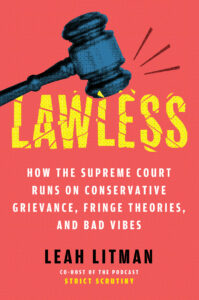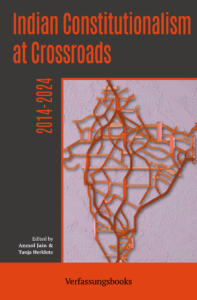The Law of Lawlessness
A Recap of Supreme Court’s Last Term
The Supreme Court’s last term was marked by more than a few disturbing developments. Among the most consequential was the Republican justices’ slow and steady legitimization of the Trump administration’s de-legitimization campaign against the lower federal courts – a trend that includes, but also goes beyond, last week’s ruling in Trump v. CASA. In several different decisions, the Supreme Court gave a boost to the Trumpian rhetoric that insists that federal courts enforcing federal laws against the administration are somehow illegitimate – and to the idea that it is the lower court decisions restraining the administration, rather than the administration’s lack of legal restraint, that are the real threat to the constitutional system.
Trump and his administration have resisted the prospect of judicial oversight in myriad ways. Chief among them is said de-legitimization campaign against judges and the authority of federal court decisions. When asked by Laura Ingraham about his administration’s compliance with court orders, Trump shifted to talking about how bad certain judges are: “I’ve had the worst judges. I’ve had crooked judges.” Trump called Judge Boasberg, who oversaw the initial Alien Enemies Act litigation, a “Radical Left Lunatic of a Judge,” and “a troublemaker and agitator” who “should be IMPEACHED.” In a statement issued after Judge Boasberg’s initial ruling against the administration, Attorney General Pamela Jo Bondi claimed that “a DC trial judge supported Tren de Aragua terrorists over the safety of Americans.” Trump has suggested that judges who ruled against him might be “corrupt” and that “maybe we have to look at the judges because I think it’s a very serious violation.” Trump has demonized the courts and painted them as a threat, calling for “courageous JUSTICE” as he insisted that “if the Courts don’t allow what we have been allowed to do for 250 years, America can longer be the same.”
This rhetoric has extended to the administration’s defiance of the courts. White House press secretary Karoline Leavitt declared that the media was “fearmongering” about the prospect of a constitutional crisis where the executive branch would not comply with court orders when “[t]he real constitutional crisis is taking place within our judicial branch, where District Court judges and liberal districts across the country are abusing their power to unilaterally block President Trump’s basic executive authority.” She has described certain lower court rulings against the administration as “unconstitutional” and “unfair”: “You cannot have a low-level district court judge filing an injunction to usurp the executive authority of the President.” Vice President Vance has said that it is “illegal” for a judge to issue certain commands to certain executive officers because “judges aren’t allowed to control the executive’s legitimate power.” When asked by Senator Elizabeth Warren whether he would comply with a hypothetical lower court order, Defense Secretary Pete Hegseth answered “I don’t believe district courts should determine national security policy.” But, he added, “if the Supreme Court rules on a topic, we will abide by that.”
++++++++++Advertisement++++++++++++
Rechtliche Fragen von morgen schon heute bearbeiten!
3+ Universitätsassistent*innen – Dissertationsstellen
Haben Sie Interesse an einer Dissertation im Bereich Digitalisierung, Nachhaltigkeit, Mobilität, Rechtsphilosophie oder Gender und Recht?
Das forschungsstarke Institut für Theorie und Zukunft des Rechts der Universität Innsbruck (Prof. Kettemann, Prof. Kirchmair (ab 1.9.), Ass.-Prof.in Rauchegger und Ass.-Prof.in Voithofer) schreibt zum 15.9.2025 drei Dissertationsstellen aus. Weitere Stellen sollen über Drittmittel finanziert werden.
Wir freuen uns auf Ihre Bewerbung bis 22.7.2025.
Mehr zum Institut finden Sie hier.
Bitte bewerben Sie sich auf alle ausgeschriebenen Stellen zugleich: 15210, 15212, 15213.
++++++++++++++++++++++++++++++++
Add to this rhetoric that several federal judges have found the administration has clearly violated their court orders. The two highest profile examples occurred on matters pertaining to federal immigration. In the initial Alien Enemies Act case, the federal government refused to turn around planes that had departed after Judge Boasberg ordered them to do so. (A recent whistleblower report suggests this action followed direction from, among others, Emil Bove, now a judicial nominee to the Third Circuit.) And in the third country removal case, after a judge restrained and enjoined the administration from deporting people to countries other than those designated for removal in a removal order without providing the people with notice and the opportunity to challenge their removal to a particular locale, the administration sent some men to El Salvador via Guantanamo Bay, attempted to send others to Libya, and put some southeast Asian men on a plane headed to Sudan. All without a semblance of due process.
Various Trump administration officials have floated impeaching lower court judges who rule against the administration. Some Republicans in Congress have expressed their willingness to do so. Last week, the administration filed a lawsuit against all 15 federal judges in Maryland over an order blocking the immediate deportation of migrants challenging their removal.
Federal judges have recently faced a spike in threats directed at them and their families. After Justice Amy Coney Barrett ruled against the Trump administration on one matter, her sister’s family was the target of a bomb threat.
It is against that backdrop that the Supreme Court’s own decisions must be understood. They are happening in the context of an administration that is claiming more and more power while it attacks the very idea that the executive branch can be subject to the law, and that the lower federal courts may enforce the law against the executive branch. By ruling against the lower courts so often and in the cases they did, the Supreme Court has provided some legalistic legitimacy and cover to the administration’s de-legitimization campaign and their resistance to the lower courts.
Consider some of the lower court orders the Supreme Court has blocked. In one case, Trump v. Wilcox, the Republican appointees allowed the President to do something that lower courts cannot – that is, preemptively overrule one of the Supreme Court’s decisions. Trump fired the heads of multimember commissions in violation of federal laws that the Supreme Court’s nearly century old decision in Humphrey’s Executor makes clear are constitutional. Indeed, recent cases described Humphrey’s Executor as a case about the constitutionality of Congress limiting the President’s authority to remove the heads of multimember commissions. Lower courts blocked Trump’s removals, relying on Humphrey’s Executor. And the Supreme Court has made clear that lower courts cannot preemptively overrule a Supreme Court decision, even if that decision has been weakened and they are confident the Supreme Court will overrule it. Apparently, Presidents now have that authority. As Justice Elena Kagan wrote in her Wilcox dissent, “The current President believes that Humphrey’s should be either overruled or confined. And he has chosen to act on that belief – really, to take the law into his own hands.” The Court’s “order,” she observed, “allows the President to overrule Humphrey’s by fiat” even though it “often reminds other judges that if one of our precedents has direct application […] they must follow it […] leaving to this Court the prerogative of overruling its own decisions.”
++++++++++Advertisement++++++++++++
The European Center for Constitutional And Human Rights in Berlin is seeking a person (gn) with at least two years of relevant professional experience to work in the field of “International Crimes and Accountability.” As part of the four-year project funded by the European Commission “Global Initiative Against Impunity For International Crimes and Serious Human Rights Violations: Making Justice Work,” the position of Project Coordinator is to be filled. We are an independent, non-profit human rights organisation primarily working through legal means. An exciting and challenging job in an internationally active human rights organisation with a worldwide network and numerous benefits are waiting for you!
++++++++++++++++++++++++++++++++
The Supreme Court also granted the government’s request to block two of the orders that the administration appears to have most clearly violated – the order blocking the initial expulsions under the Alien Enemies Act and directing the administration to turn the planes around, and the order barring the government from carrying out third country removals without affording due process. In her dissent from the third country removal decision, Justice Sotomayor wrote “[E]ach time this Court rewards noncompliance with discretionary relief, it further erodes respect for courts and for the rule of law.” The Supreme Court has not made the administration pay a price for its defiance of lower court orders; instead, it has removed the administration’s continued obligation to comply with the orders it has defied, lending some credibility to the administration’s claim that the orders were never legitimate to begin with.
Just last night, the Court granted the administration’s motion to “clarify” the Court’s unreasoned, unexplained order in the third country removal matter. In doing so, the Court made clear that its previous order was apparently so capacious that it also blocked the district court’s remedial order that had directed the government to afford the men whom the government tried to send to south Sudan (in violation of a lower court order) some semblance of due process. The Supreme Court still did not deign to explain why the lower court’s initial order was incorrect. In a blistering dissent, Justice Sotomayor wrote “Today’s order clarifies only one thing: Other litigants must follow the rules, but the administration has the Supreme Court on speed dial.”
It is this context that also makes the Court’s decision in the nationwide injunction case Trump v. CASA galling. The Supreme Court had opportunities to take up the propriety of nationwide injunctions at the request of the Biden administration. It declined to do so. Instead, the Republican justices opted to opine on the issue, and limit lower courts’ authority, in the first six months of an administration that is engaged in brazen and systematic violations of the law – and in a case that involves some of the clearest examples of the administration’s lawlessness. The birthright citizenship executive order is illegal. By choosing to curb lower courts’ authority in a case that involves some of the most brazen, transparent lawlessness, the Court once again lent credibility and legalistic talking points to the administration’s egregious violations of the law. Various administration officials have been crowing about the Court’s decision – which bolsters, in a general and loose sense, the administration’s attacks on lower courts that deign to rule against the administration. The Court sent a message by weighing in on this issue in this case and in this moment: The administration’s complaints about lower court oversight are on to something – and they should keep pressing the point.
Those concerns and critiques feature prominently in both Justice Sotomayor and Justice Jackson’s dissent in the case. Justice Sotomayor’s dissent chastised the Court for “shamefully” “play[ing] along” with the government’s “gamesmanship” – the government’s request for a ruling in its favor in one of the cases where it has no serious defense on the merits because its policy is wildly illegal. “Because I will not be complicit in so grave an attack on our system,” she wrote for the three Democratic appointees, “I dissent.” Justice Jackson’s dissent wrote even more pointedly about the Court’s role in facilitating disrespect of lower courts: “[T]his Court’s complicity in the creation of a culture of disdain for lower courts, their rulings, and the law (as they interpret it) will surely hasten the downfall of our governing institutions.”
In isolation, and in the abstract, there are some plausible defenses of at least some of these Supreme Court decisions. But in the aggregate, and in context, they amount to a stunning legitimation and enabling of a lawless executive branch that is opposed to the idea that the President and the executive branch are subject to the law. As is too often the case, the Republican justices are legalizing the bad vibes of a Republican Party and president – here, utter lawlessness. To the extent there is law in what the Republican justices are doing, it is a body of law that is for lawlessness and that invites more of it.
 This editorial is part of our Spotlight series on “US Democracy Under Threat“, featuring contributions from leading scholars in law and political science.
This editorial is part of our Spotlight series on “US Democracy Under Threat“, featuring contributions from leading scholars in law and political science.
Leah Litman the author of the recent NYT Best-Seller, LAWLESS: How the Supreme Court Runs on Conservative Grievance, Fringe Theories, & Bad Vibes.
*
Editor’s Pick
by JANA TRAPP
 You can’t name a dog as Editor’s Pick, even if they’re giving you those big, pleading eyes. But if there’s something I want to share this week that has given me that quiet kind of hope only my dog usually can, it’s Mary Oliver’s Dog Songs.
You can’t name a dog as Editor’s Pick, even if they’re giving you those big, pleading eyes. But if there’s something I want to share this week that has given me that quiet kind of hope only my dog usually can, it’s Mary Oliver’s Dog Songs.
Oliver has achieved something rare with this collection of poems: she captures what it means to have a four-legged comforter by your side – wet nose, wagging tail, and a look that says it all. “Everybody needs a safe place,” she writes. Her love letters to dogs are exactly that: a place that’s safe, warm, a little rumpled, full of love and the bittersweet knowledge that every goodbye will come in time. Reading these poems, you feel the quiet joy dogs bring into our lives and remember to notice the little things again. Maybe today you’ll hug your dog a little tighter. And if you don’t have one – this book is the next best way to feel that gentle, healing touch on your heart.
*
The Week on Verfassungsblog
summarised by CHARLOTTE HERBERT
The Trump administration’s delegitimisation campaigns (see LEAH LITMAN above) not only continue to threaten the independence of the judiciary, but also academic freedom. The president of the University of Virginia resigned after the White House launched a political campaign against him. J. PETER BRYNE (ENG) explains that the university’s diversity, equity, and inclusion (DEI) policies were entirely lawful. But that counts for little when institutional and public support starts to erode in an increasingly authoritarian environment.
In terms of foreign policy, Trump is relying on deterrence against Iran. MARY ELLEN O’CONNELL (ENG) challenges NATO Secretary General Mark Rutte, who declared recent US attacks on Iran compatible with international law before Trump’s visit to The Hague. She argues that relying on the theory of deterrence undermines the surest path to peace.
Similarly, MICHAEL J. GLENNON (ENG) shows that the US attack not only violated international law but also US constitutional law: it should have required congressional approval.
Meanwhile, in the EU, asylum law was front and centre this week. Italy’s controversial attempt to outsource asylum procedures to Albania has now been submitted to the ECJ in a preliminary ruling procedure. ANDREINA DE LEO (ENG) examines the legal fictions underpinning this plan and what the future holds for Italy’s externalisation model.
Italy’s asylum policy also comes under scrutiny from MALAK HARB (ENG) who analyses the recent ECtHR judgment in S.S. and Others v. Italy, criticising that instead of addressing the issue of functional jurisdiction in the context of externalised migration control, the Court merely stated that Italy had no extraterritorial jurisdiction over a group of irregular migrants whose boat had capsized in international waters off the Libyan coast.
MATILDE ROCCA (ENG) takes a more positive view of the ECJ Grand Chamber’s decision in Kinsa, calling it an important step towards decriminalising care for refugee children – though she warns that protection standards could still be weakened in the future.
In Germany, debate continues over pushbacks at internal borders. Despite a ruling by the Berlin Administrative Court, Interior Minister Dobrindt has continued to order returns – which is likely unlawful. This raises the question: are federal officials obliged to file formal objections (that is, to remonstrate)? ANDREAS NITSCHKE and KLAUS KREBS (GER) argue they are not: even with legitimate doubts about the legality of such orders, the threshold for this duty remains high.
A different kind of legal obligation, however, is emphasised by JOACHIM WIELAND (GER): the German legislature is obliged to reform abortion law according to Article 1(1) of the Basic Law: the state must respect the dignity of pregnant people – and the current legal framework violates that obligation.
Romania and Hungary also made headlines this week. In Romania, mandatory asset declarations had initially removed hundreds of corrupt officials from office – until the Constitutional Court struck down the practice. TILMAN HOPPE (ENG) warns that other countries would do well not to follow suit.
LEIJLA KRUSEVLJANIN (ENG) comments on Advocate General Ćapeta’s opinion in Commission v Hungary, which concerns Hungary’s so-called “anti-LGBTIQ” law. She defends the Advocate General’s reasoning as a constitutionally sound and necessary step to uphold the Union’s core values.
JANNIS LENNARTZ and VIKTORIA KRAETZIG (ENG) welcome the opinion of Advocate General Emiliou in the Pelham copyright case. At last, they argue, a legal perspective that puts authors and artists back at the centre – and reminds us that copyright exists to protect creativity, not just commercial interests.
++++++++++Advertisement++++++++++++
Out now! ✨
Anmol Jain & Tanja Herklotz (eds.)
Indian Constitutionalism at Crossroads: 2014-2024
Narendra Modi’s Bharatiya Janata Party (BJP) has governed India since 2014, marking a decade of challenges to various aspects of India’s democracy and constitutional system. While the last decade may not have left many conspicuous signs textually, the soul of India’s constitutional system has suffered several dents. The ruling government has launched, quite successfully, a project of redefining India, its constitutional identity, and its vision. This edited volume explores these multifaceted challenges and assesses the current state of Indian Constitutionalism.
Now available as _soft copy _(open access) and in print!
++++++++++++++++++++++++++++++++
Online, a stir was caused by the petition platform innn.it (formerly Change.org), which announced it would relinquish its non-profit status following a long legal dispute and a ruling by Germany’s Federal Fiscal Court. Who went too far – the platform or the court? ANNA LEISNER-EGENSPERGER (GER) has answers.
Speaking of going too far: how far can democracy be restricted before it ceases to be democratic? For MAXIMILIAN KRAHÉ and MICHAEL W. MÜLLER (ENG), this question opens the door to many others – especially fiscal ones.
Similarly far-reaching are the questions recently brought before the African Court on Human and Peoples’ Rights, among others, by the Pan African Lawyers Union. The court has been asked to issue an Advisory Opinion on states’ international obligations in relation to climate change. NOUWAGNON OLIVIER AFOGO, MARIA ANTONIA TIGRE, ARMANDO ROCHA and MIRIAM COHEN (EN) analyse the request and explain why it could represent a legal turning point for the region.
This week, we’ve launched our symposium on “Animal Rights: The Role of the EU Charter” (ENG), co-edited by Ester Herlin-Karnell and Matilda Arvidsson. Animals remain largely absent from EU legal discourse – especially when it comes to the Charter of Fundamental Rights. This symposium asks whether the Charter could become a catalyst for stronger animal protection across Member States. ESTER HERLIN-KARNELL and MATILDA ARVIDSSON kick it off by debating the role of the Charter in protecting non-human life and urging us to reflect on the anthropocentric focus of the law. HANS LINDAHL argues that codifying animal rights in the EU Charter means little if private law keeps commodifying life, advocating for a Charter of Human Obligations instead. POUL F. KJAER thinks that the EU Charter’s silence about animals does not reveal anything distinct about them and casts a new light on how to understand the “social condition” behind EU values. MANEESHA DECKHA wonders about the right to education: could teaching kids about harm to animals be part of their fundamental rights too? BERTJAN WOLTHUIS contends the EU got it wrong when it downgraded wolf protection after increased livestock attacks: wolves need space, not punishment, and the EU should expand its Natura 2000 framework. ESTER HERLIN-KARNELL claims that the EU has all the instruments in place for taking animal rights seriously and traces their potential. YAFFA EPSTEIN and EVA BERNET KEMPERS argue for a post-anthropocentric reinterpretation of EU animal welfare and environmental protection laws that treats non-human entities as potential rights-holders.
Even if the rights of non-human beings may not be a priority for many in the face of today’s crises, the symposium offers an important reminder: navigating these challenges requires creativity – including in how we approach the law.
*
That’s it for this week.
Take care and all the best!
Yours,
the Verfassungsblog Team
If you would like to receive the weekly editorial as an e-mail, you can subscribe here.







Once again, a very interesting and important contribution from Leah Litman (the podcast “Strict Scrutiny,” which she co-hosts, is a must-listen for anyone interested in the rule of law).
Overreaching courts that engage in political activity are a threat to the rule of law, democratic checks and balances, and trust in institutions. They pave the way for polarization, populism, and ultimately authoritarian regimes. Whether the agenda pursued by these judges is dominated by right-wing ideas, as in the case of the current SCOTUS, or by left-wing ideas is irrelevant: courts do not have a political agenda to pursue.
If you are interested in this topic, we will also be discussing it on July 7 in the webinar “The Path to Authoritarianism – Backsliding Democracies and the Role of the Institutions.” Registration is mandatory but free of charge: https://backslidingdemocracies.org/registration